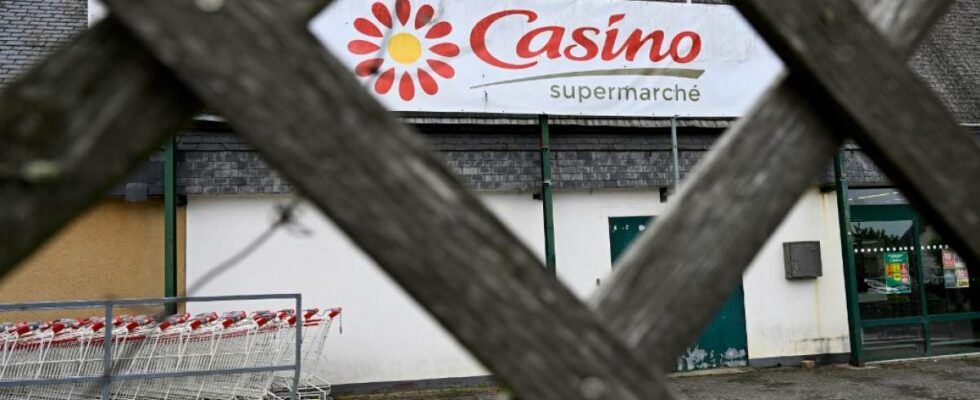(AFP / DAMIEN MEYER)
Little visible movements, but which concern thousands of jobs: the French supermarket sector is undergoing profound upheavals, between the decline of Casino and the meteoric rise of E.Leclerc, pushing everyone to react, to the detriment, according to unions, working conditions.
. Circular changes
Very high food inflation over the past two years – 21% increase on average – and the profound changes in consumption habits have had ripple consequences in the supermarket sector.
It first asphyxiated the weakest, starting with the original Saint-Etienne distributor Casino. Weighed down by its debt, it had to sell almost all of its large format stores to competitors, and its current management will soon hand over to buyers led by Czech billionaire Daniel Kretinsky.
To a lesser extent, Auchan carried out several exercises in the red.
Conversely, the sector leader E.Leclerc crushes the competition, with many consumers turning to it to try to find low prices, or lower prices than elsewhere.
“Our detractors will be able to continue to shout, to denounce our prices as too low (…) We don’t care!! Consumers have made their choice”, exclaimed its media ambassador, Michel-Edouard Leclerc, in early January, on his blog.
Intermarché and Système U, the two other independent groups, also had a good year in 2023.
. Deeper trends
The conquest of market share by independents is not new. E.Leclerc took the position of market leader from Carrefour in 2017, continuing to widen the gap since then.
Structurally, their operating costs are lower, with notably fewer permanent employees in support functions, and overall less favorable social conditions than those of integrated competitors.
One of the major concerns of Casino employees who are going to move or who have recently moved to Intermarché is losing the more advantageous social conditions they enjoyed with the Saint-Etienne distributor.
E.Leclerc or Système U, independent and not listed on the stock exchange, also do not need to spend billions of euros in dividends to remunerate shareholders or buy back shares, as Carrefour does. So much money that could have been allocated to greater commercial efficiency, the unions insist.
. Connections and concentration
The dynamism of E.Leclerc pushes the entire sector to react. Intermarché and Auchan have set their sights on numerous Casino stores, as has Carrefour, which had taken over the Cora and Match brands a few months earlier. Objective: stay in the market share game.
Système U, the fourth French distributor, has made a merger with a player well established locally, in Burgundy in particular, Schiever, which has become a member. He was previously associated with Auchan but said he was not convinced by the merger of the northern group with Intermarché.
The latter and Auchan have also designed, in partnership with what remains of Casino, a purchasing alliance project which would be in the very long term: ten years. Objective, according to Auchan: to improve “its costs and sales prices”, notably through “negotiation on the purchase” of major brand products.
. Serious social consequences
Auchan management did not specify whether the synergies would have an impact on employment. Competition from independents in any case pushes integrated companies to find savings.
Alexandre Bompard, CEO of Carrefour, is targeting one billion euros in “cost savings” each year until 2026, notably through “significant workforce reductions in each” of the European headquarters, including in France.
Jobs in stores are not spared, with the transition of many stores to franchise or lease management. This movement consisting of ceding the management of points of sale to third parties has resulted in more than 300 stores and more than 23,000 employees outsourced since 2017, according to a CFDT count.
This union announced on Monday that it would take the distributor to court, accusing it of a policy that it considers illegal and that it equates to “local relocation, where social issues are outsourced”, Sylvain Macé explained to AFP. “We cannot remain inactive in the face of what will concern hundreds of thousands of employees.”
